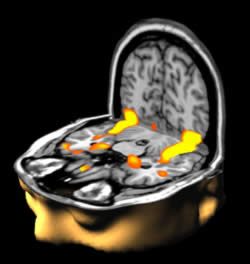This week a group of researchers from California have been able to spot the moment at which your brain recognises a face. They've done this using the brain scanning technology known as fMRI - or functional magnetic resonance imaging.
The team, led by Jesse Rissman, had their test subjects look at hundreds of faces from an image database. They were then shown a new set of faces, some of which had appeared in the database. As the subjects looked at each of these new pictures the researchers scanned their brains to see if anything happened.
 When the subjects did recognise a face there was an identifiable pattern of neural activity in their brains. According to the journal PNAS, where this was published, the team used software to recognise this pattern as there were quite a few neurons to consider. They found that this so-called 'neural signature' when a brain recognises a face was consistent across all the test subjects. So it's likely that whenever any of use recognises a face, the same bits of our brain 'light up'.
When the subjects did recognise a face there was an identifiable pattern of neural activity in their brains. According to the journal PNAS, where this was published, the team used software to recognise this pattern as there were quite a few neurons to consider. They found that this so-called 'neural signature' when a brain recognises a face was consistent across all the test subjects. So it's likely that whenever any of use recognises a face, the same bits of our brain 'light up'.
There was one problem, however, in that sometimes the test subjects recognised a face even when they hadn't seen it before. Their brain activity was the same as with a genuine recognition so if you wanted to take an fMRI of someone examining a police line-up it wouldn't be able to rule out any false-positives. The scanning software can tell you if someone believes they recognise a face but one of the key findings here is that the researchers have been able to pinpoint what happens when memories are triggered.










Comments
Add a comment